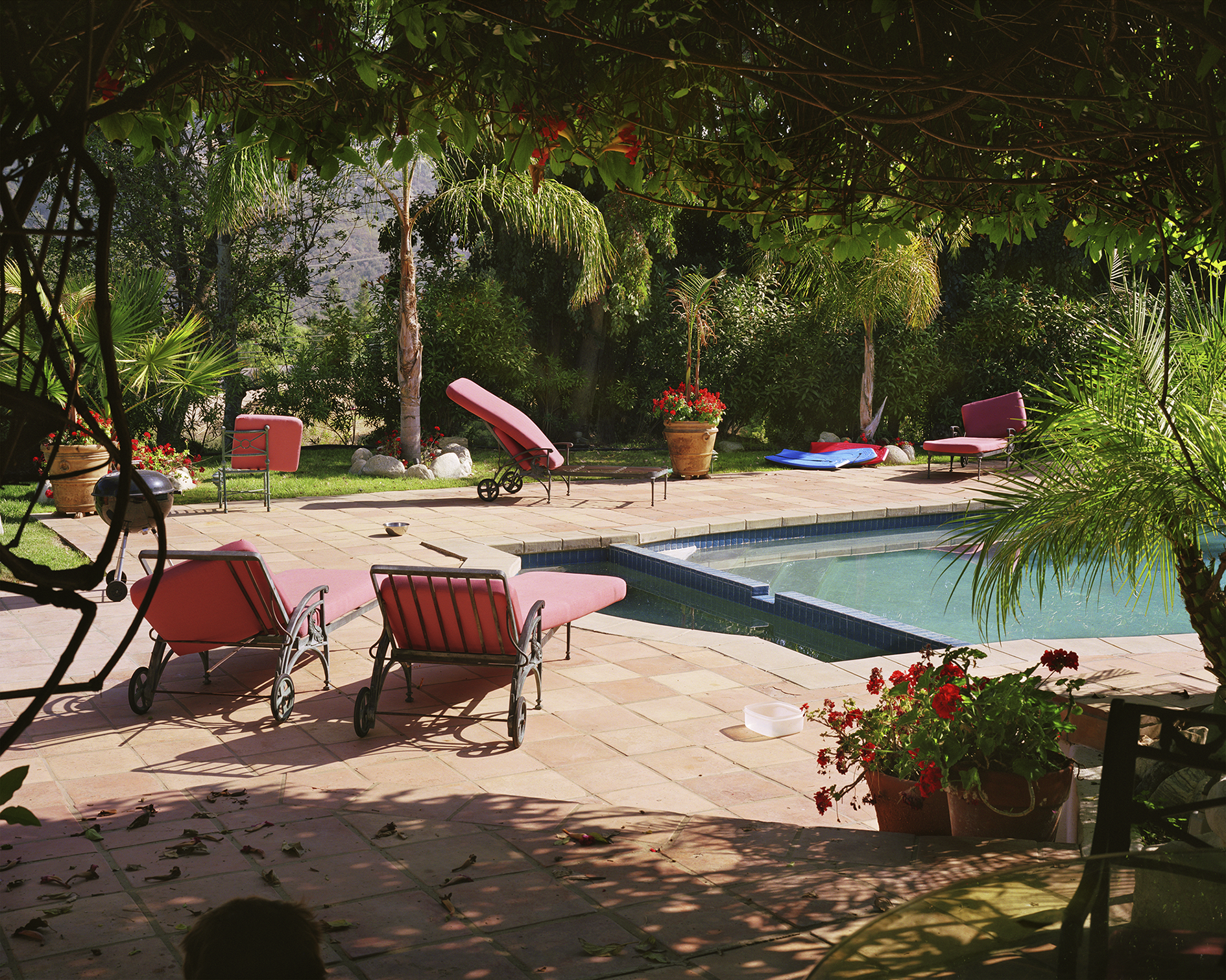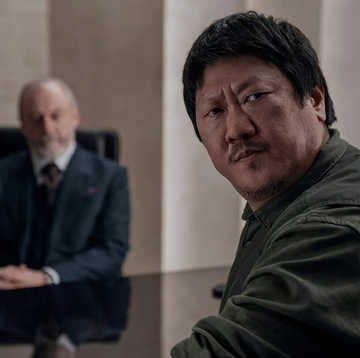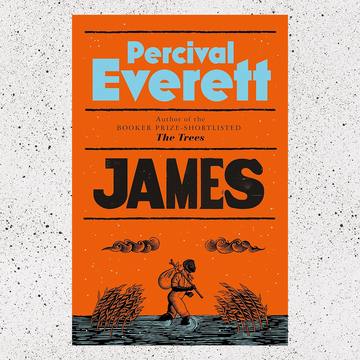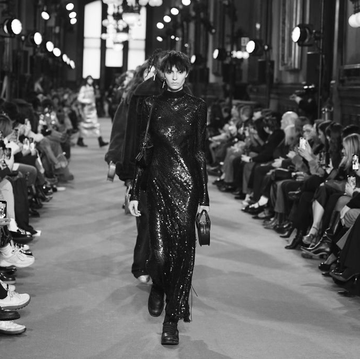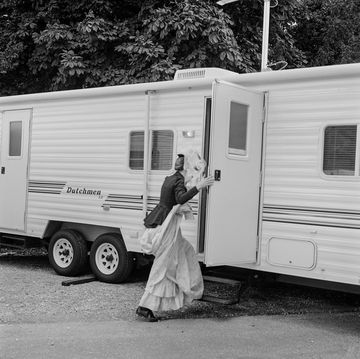The summer the Gables and the Franklins fell in love with each other they were drunk off their best gin, their just-waning youths and their own good fortunes. They became rich, and then they became neighbours. Helen and Logan Gable (old family money) moved to Westerhazy Lane that spring, after Grandmother Dorothea left the Victorian to Lo, only a few months before Angie and Kit Franklin (their own money, Kit worked at a hedge fund called Privateer, so, perhaps, “their own” money) bought and gutted the Colonial next door, renovating it in a sleek, modern way commonly agreed upon as desirable.
Summer’s end was marked by the last weekend before the first day of school. Angie was the assistant field-hockey coach at the university and tryouts were just past. Angie spent the evening dry-lining the field for their first official practice. Someone from Buildings and Grounds had come by but she’d insisted on doing it herself. When she was through, the neat, chalked lines across the terrain pleased her greatly and she was exhausted but happy when she got home to Westerhazy, only then realising the dry-line marker was still in the trunk of her Subaru.
The backyard was a situation. Backyards, rather, because while there was no physical marker of the place where the yard beyond the Gables’ solarium doors became a different yard that ran up to the flagstones outside the sliding-glass door to the Franklins’ kitchen, these were two separate properties, legally speaking, and somewhere such a line was surely drawn on a map. The yards used to be distinguishable by their aesthetics, but Kit grew so frustrated with how shaggy the Gables let their side grow and had started mowing it for them and taking the price out of Logan in cocktails, at which point even the lawn didn’t reflect their boundaries. In the middle swath of lawn between the houses there was a full croquet set abandoned mid-game and an assortment of chairs friends had left in anticipation of their return and it was here all four Westerhazies gathered most evenings. Helen had bought tiki torches, and Kit noted, in a way he’d thought was funny, that he wasn’t sure how to feel about white people with torches, and Helen, instead of laughing, offered to throw the torches away, apologising in a way that was so over the top it seemed she was also apologising to some unseen delegate of other Black people. Kit smacked a mosquito to death on his arm, and said, “Jesus, Helen, I’m getting eaten alive, light the torches already.” And so Helen had, and the awkwardness passed, though the torches remained a reminder, and everyone hoped they would soon run through their fuel so they could buy some goddamned citronella candles.
That night, when the Gables and the Franklins gathered, everything had the energy of fall coming over it. That last chance for ease feeling that compels people to squash too much love and fun into the final days of summer. As the sun sank, an overripe smell came from the orchard grasses and a gold tinge beset everything that had once seemed green. It got darker outside but no cooler and hot air hung across everyone’s shoulders like a mantle. Logan made them cocktails and he didn’t seem to be measuring anything he poured from the bottles on his grandmother’s cocktail cart on wheels, but the rattle of ice in the shaker was festive. They drank from small glasses, etched around the rim, so delicate it was a miracle they did not crack upon their searching mouths. The whole arrangement struck Kit as a very convincing imitation of adulthood.
They were adult, of course.
(They were all of them 29.)
They added ice to their cocktails. Drank them thirstily, too fast. They grew bored and then scared of being bored and so they toasted to everything they could think of. They toasted to getting a proper patio set for next season. They toasted Kit for being rich. They toasted Helen for not losing the expensive pair of sunglasses she’d bought in May and had worried she would lose before the summer was over.
“TO HELEN’S SUNGLASSES,” they all said.
Angie was now only in her sports bra and shorts and Kit’s shirt was unbuttoned.
Helen lay in the grass and rolled around.
“What’s that doing for you?” Kit asked.
“I’m pretending I’m in a pool,” Helen said.
“You’re nuts,” Angie said, laughing in such a way that Kit admired the muscles across her stomach for how they rose and receded with the laughter. Angie had always been fit but she’d been prepping drills for the season and a new strength had seized her body. This new body, which had been inside his wife’s body — Kit had not seen it coming. He tossed back the end of his cocktail and crunched the ice.
“Pretend with me, it’s very nice,” Helen said.
Logan, who was always very ready to Yes, And, lay on his stomach and pretended to Australian crawl across the lawn.“Oh, god,” Angie said. She chucked ice cubes at them. “I’m embarrassed just watching you.”
Logan warbled in a put-on voice, “Come on in, the water’s fine!”
Helen and Lo were theatre people. Logan was either affecting or recovering from a Hepburnish mid-Atlantic accent and taught drama at the university. Helen had a soft cadence, having grown up in Virginia. She sewed costumes for the local playhouse. The first night they’d met, Angie— remembering a teenaged phase when she’d felt uniquely understood by the orphan Eponine and learned all the lyrics to Les Misérables — offered this up and she and Logan sang a few bars. Angie was Italian, from the Bronx, and sang like it, but the lyrics were still there, at the ready, inside her. Kit was alarmed he might never have known these lyrics were in his wife’s head at all without the Gables, but also intrigued that he might learn new things about her in their company. He had grown up just a few hours from Westerhazy in New London, his father stationed at the naval base there, but the Gables made that feel like another planet.
“Forget the patio furniture,” Kit said — and for many years to come Kit would remember that it was he who had suggested this — “a pool is what we really need.”
“Kit?” Angie said.
He paced around the Gables. The gin helped Kit imagine the wild possibility of it. Imagine himself as a man with a pool. Imagine his kids growing up swimming, neon floaties on their chubby arms, splashing in the shallow end. Kit was sentimental about his hypothetical fatherhood.
He could see it. He just couldn’t pace it.
“There’s not room enough for a pool back here,” Angie said, reading his thoughts, or, perhaps, warning him.
Helen sat up, brushing grass clippings from her freckled forearms. She tightened her yellow headwrap. “Things were handled badly with the subdivision,” she said. Her accent grew stronger when she drank, Kit noticed, ba-yud-ly.
“We each have room for about half a pool,” Kit declared.
“Perfect!” Logan said, righting himself. “Let’s do it.”
He looked very handsome just then, the way pale people do after the luxury of summer sun. His shirt was open at the neck.
“Do what, dear?” Helen was mixing them fresh drinks.
“Build a pool!” Logan said.
“Half a pool,” Kit said.
“Half plus half,” Logan said, “is one whole pool.”
“There really is just enough room,” Angie was eyeballing it now, pulling her hair up from the base of her neck where it was making her too hot. “If we did it together across the yards it would be the perfect size.”
“Isn’t it illegal?” Helen said. “To do that?”
“Says who!” Logan said, “It’s our land, isn’t it? We can do whatever we want with it.”
(It was, to be clear, not their land. It was Mohegan land. Alas, this was not on their minds. Westerhazy was still a little wild back then. Not very wild. It was still Fairfield County. Still Connecticut. The United States. The Gold Coast. 2006. But fewer things had been subdivided and more woods were still standing and no one had paved over the wetlands to add another lane to the parkway in the middle of the night. And so, even though they could hear the pulse of the highway from their windows, there were also troupes of coyotes who yipped and celebrated at night. Both the Gables and the Franklins could hear them. When they did, Helen always yipped along in bed and Angie murmured, you get ’em, before rolling over (the men were not compelled to dialogue with the coyotes, a small tragedy of gender). And so they lived in a wild place and a tame place and they were comfortable but not bored and this was good.)
Helen started imagining the pool for them: “Here’s where the ladder to the deep end will be. I think we should have a lovely bench right there for soaking. God, I wish I were soaking right now.” She was in the middle of the croquet court now. A crushed beer can beneath the third wicket. Her hair was frizzing up, her headwrap unspooling.
“I think there should be a hot tub,” Angie said, and Kit looked at her, surprised. She smiled. Her face was sweaty but glowing. She was holding her hair up off her neck, the clean slice of her sports bra cutting across her strong shoulders. Kit imagined his beautiful wife soaking her muscles in a hot tub, imagined himself sinking in beside her. In fact, he imagined this: driving home from work, parking in the cul-de-sac near the daylily patch, and in the time it took him to walk from the drive to the house, stripping off every bit of clothing, his tie, his button-down, his undershirt, his pants, then unlatching a garden gate — even in Kit’s fantasy, there was a gate for safety — and then running, leaping naked into the clean water and washing the whole of the day at Privateer away.
But then, Kit realised he had to factor Logan and Helen into his vision.
He revised himself into a swimsuit. It was still good. Even then.
“I doubt it would be good for the value of the property,” Angie said.
“Who doesn’t want a pool!” Helen said.
“A shared pool,” Kit corrected.
“You only have to care about property value if you ever plan to move,” Logan said, like a true Gable. He gestured around at his grandmother’s erstwhile yard. Fireflies clustered over the patches of unmown grass and the tomatoes Helen had planted in May. They were now so bountiful they bowed their stalks. “Who’s going anywhere?” Logan said.
Angie was running to the driveway now and they all shouted after her, “Angie, we love you, come back!”
In this moment, this moment of the summer, this moment of his youth, this moment many cocktails deep into the evening,
Angie returned, giggling a mischievous drunken laugh Kit remembered from those nights on the way home from Privateer when they used to go to The Shebeen for drinks and it felt like they were up to something. Ever since they left the city, he feared they were teetering on the precipice of an adulthood that would snatch their youth away and, with it, their happiness.
But could he imagine Angie laughing this way, by a pool? He could.
Angie had the dry-line marker, still full of white chalk.
She cleared her throat, gestured to it, then began trotting the marker around the yard, well, the yards really, but this was the last time they were ever truly plural. She drew a wobbly orb, a gallbladdery shape around Kit and the Gables. When she was finished, she came puffing over. They sat at its centre.
“There you go,” Angie said. “Our pool.”
Kit didn’t believe in the gris-gris his Louisiana grandmother sometimes talked about, but he knew there was a strange power in drawing a white-chalk circle. That enclosing them in its shape bound them together. He felt as he had on his wedding day, when he and Angie had traded rings and said a vow. It was a serious thing that could not be undone easily.
The pool was open.
It was all the more stunning for taking up so much of the yard. If you exited the Franklins’ or the Gables’ house you found yourself, at once, on the shared deck, made of red cedar planks, perfectly smooth. The pool was built of grey stone and water ran in a fountainfall from the tub at the far end. Its wobbly organ-shape seemed always to invite the swimmer to greater depths. The water was teal, jewel-like when the sun cut through it to the stones beneath, though sometimes this effect was marred by several dozen waxy magnolia leaves from the Gables’ pink-blooming tree —which was absolutely too close to the pool — which were always dropping in, traversing the water’s surface like an armada of elfin boats, no matter how often some teenage boy was paid to scoop them out with a net.
The Franklins’ tree bloomed white and was far enough away from the pool that its leaves never dropped in, because Kit had considered such things.
He’d asked Logan whether it might be possible to uproot and replant his tree, to move it back a bit. “Sure, sure,” Logan had said. He would look into it. But the tree did not seem to interest Logan and Kit had come to understand that Logan was only a man of action in matters that did not bore him.
But it was summer again, and they’d decided to throw a party. It was important to them that the party make clear they’d built a pool so people could swim in it, not just so they could say they had a pool. So many pools serve only as a performance of wealth, a painting on the wall no one admires but whose provenance everyone is quick to mention while showing guests the way to the powder room. This was not what the Gables and Franklins wanted, or, at least, not all they wanted. They also wanted bodies in the pool. They wanted the pool to give them permission to be bodies, half-naked and buoyant. To feel young, and mischievous, and beautiful. To invite their friends to do the same. So they told their guests it was a pool party, but, as people arrived, it turned out this meant vastly different things to different people.
Some guests had not even worn swimsuits.
Rita, from the playhouse, arrived in a black smock and colourful beaded necklace and carried a bottle of chilled gin, because pool party. Jay and Brandon from the hedge fund both wore loud swim trunks which Kit immediately referred to as whiteboy shorts, even though Brandon was white and Jay was Black, because they were pastel and printed with little seashells and whales on them respectively. They had gone shopping on lunchbreak and bought them, together, it turned out, because pool party. Angie had invited friends from FU Athletics who had all come in functional swimwear as if they anticipated not only swimming but also possibly competition, because pool party. Boyd, Logan’s ancient theatre mentor, the chair of the department, wore a seersucker suit and palm hat, perhaps having conflated pool party with garden party, but he looked so splendid there was no objecting.
Two hours into the party and the guests strolled around the pool, complimenting it to each other, enquiring about contractors, asking who knew who and how. There was a merry din of chatter. They were like members of a wedding party — Franklins or Gables? Bride or the groom?
And then there was Lily.
Paul had come too, but really, there was Lily.
If you had asked Logan why he thought it appropriate to invite his students to a pool party otherwise comprised of adults, professors and coaches — and Kit really would have liked to ask him, as he immediately saw how uncomfortable having students around made Angie’s Athletics colleagues who were, by this time, soused— Logan would have said: because they are adults.
It was true that Lily and Paul were 21 and maybe that was all that counted in Lo’s book. Or maybe it was because Lo was a genius when it came to parties, which are their own kind of theatre, and he knew that, by inviting them, there would be something intriguing for the rest of the guests to talk about. A tension in the air created by two beautiful young people in their midst.
The semester was just now ending and in the production of A Streetcar Named Desire Lo had directed, Paul had played Stanley, and Lily, Blanche. Helen saw it on opening night with both Franklins as her dates. As a southerner, Helen dreaded the play for the way so many actors turned Blanche into a cartoonish spectacle of heavily accented whims. But Lily did no accent work whatsoever. She was aware of how the words should fall, and played the role like a person who understood the pain Blanche’s lines were obscuring. Paul, for his part, was a surprising Stanley. He was queer, and Korean-American, and he brought himself to the table, playing Stanley queerish, and Koreanish, and he was so sexually magnetic that Helen and Angie later confessed it made them uncomfortable to be asked to see this 21-year-old in such a light. It was a performance that made the tension of all the unsaid things, all the unmet desires between the actors, bristlingly tense. The audience was rapt.
For all the ways it had been easy to see Lily and Paul as adults onstage, their interpretation of “pool party” made this impossible in real life.
Lily arrived in a bikini Helen could only assume was made of a sweater. It was two rainbow-crocheted triangles and she wore it with jean shorts that inexplicably went above Lily’s navel but did not cover her butt. Paul wore black, knee-length denim cut-offs and a green, Hawaiian shirt open over his bare chest, which was heavily tattooed with a traditional assortment of daggered hearts, sparrows and ships. His nipples were pierced.
The party clocked them when they arrived.
A car beeped as Lily locked it and they crossed the lawn. Paul did not break stride as he dropped a jug of Carlo Rossi onto the drinks table, flung his shirt onto a chaise and jack-knifed into the water.
Until that point, no one’s definition of pool party had involved going into the pool.
Lily followed close behind and soon the two of them were frolicking in a way that was not strictly sexual for Lily’s relative straightness and Paul’s relative queerness, and yet they were so clearly in love with each other, so appreciative of each other’s beauty, and they were dramatic, and they were devastatingly young.
If you had spoken to the party’s guests before Lily and Paul arrived you would have found them cheerful. Most of the guests considered themselves young. They were not yet 30! They were at a pool party!
That was now over.
The late-twenties were an age that hung on them differently. And while some of the guests (the single, the queer, the artistic, the childless, the all-of-the-above) had found the party disappointingly adult and pitied the Gables and Franklins for their premature domestication, others (the married, the parental, the corporate landowning class) found the party eccentric, wild even, and were rejuvenated by the occasion. This was the way of the late-twenties: the life choices of others manifested suddenly and garishly and it rattled a person to think there were so many different ways of living. Surely they couldn’t all be making the right choices, could they? Surely some of them were wrong?
In a way, Paul jack-knifing into the pool and Lily splashing in her sweater bikini resolved this existential crisis for the guests. The illusion that they were in the prime of life was dispatched at the moment of Paul’s jack-knifing into the unbroken surface of the water. Whatever differences existed between them, they were no longer young.
Everyone began acting strangely. Trying to prove to Lily and Paul, or perhaps to each other, or perhaps to themselves, that they could still hang. That this was a cool party. That they were not so different from people they had been five and 10 and 15 years ago. Brandon shot-gunned a beer. Rita started making people try on her necklace and talking about sex. Even Kit was not immune, and found himself cursing more than he naturally did.
But the party wore on, and it refused to stop being a perfectly lovely adult party.
Then it was dark out, elevenish, the lawn illuminated by two overlapping circles of light projected from the outdoor floodlights of the Westerhazy houses. The guests had thinned out.
The Gables and the Franklins were disappointed. They had imagined the pool party would make them feel giddy, like teenagers telling friends their parents were out of town for the weekend. Instead, they felt like the parents.
Perhaps that’s why Kit started shuffling a deck of the Gables’ playing cards and suggested they play Kings.
“Hell, yes,” said Jay from the hedge fund.
“You’re taking us here?” Angie said.
“Everyone needs a new drink,” Kit said.
“What’s Kings?” Lily asked Logan, seeking knowledge from a mentor.
“No idea,” Lo said.
“A drinking game!” Angie exclaimed. “You must have played in college.”
“You have fundamentally misunderstood the nature of Logan Gable in college,” Helen laughed. “I played once, freshman year. Each card is a prompt, a dare, a rule.”
And so they played Kings.
They gathered chairs in a circle on the illuminated lawn, the cards on a table in the centre. Fours were rules and after Logan pulled one everyone had to refer to him as the emperor of ice cream. Sixes were for drinking, and Kit had to drink a six-ingredient cocktail mixed by Jay that was actually very good if you didn’t have to take more than a sip of it, which Kit, alas, did. Jacks were dares and Rita and Boyd were dared to jump in the pool. They did, and then proceeded to put on what Boyd called a mermaid show. When they came out, Boyd’s suit sopping wet, Brandon and Jay brought them towels and patted them dry. By this point, they were feeling very drunk and lit up. The party had finally found its momentum.
Aces were imitations. The theatre kids had insisted. It was super-bonding, Paul said, when they did them in class.
You had to do the person seated to your left.
Lily pulled the ace of hearts, which meant Logan. She stood up, flicking the card in her hand a few times, and then placed it on the table. She was still in her crocheted bathing suit, and now wore Paul’s shirt over it, her long white thighs bare beneath the Hawaiian print.
She shook out her shoulders, which seemed a bit much, but she was a drama student. Lily turned to Logan: “Permission to proceed?”
“I want to see this,” Boyd said, leaning forward in his chair, still dripping.
Logan nodded, smiling, like the owner of a racehorse who knows exactly what it is capable of.
Lily began walking the inside of their circle like a track. At first, it seemed she was just gathering her thoughts, but as she walked, her gait changed. She sank into her pelvis as she moved, leaned back so that her hips preceded the rest of her. Then, she added a slight bounce to the way she lifted out her step, a spring. She did two more laps, adding a neck swivel, surveying the guests. Lily cast her eyes on Boyd and her whole body drew upward, as if pulled by a spring, and then, as part of the downward motion, she rushed toward him, lifted him from his seat, scrutinised him, brushed off his shoulders and just as she seemed on the brink of saying something... cast her roving eyes upon greener pastures, someone more important to talk to, upon Paul, and shoved Boyd away (Boyd began laughing). Lily rushed over and all but collapsed, cross-legged, in front of Paul, hands on hert highs. She leaned in conspiratorially, and said, “Tell me something true.”
They yelled and clapped.
“Holy shit,” Kit said. He’d never seen anything like it. The girl had become, completely, Logan. Things he had not even realised about Logan; his walk, for example. Was this acting?
Logan walked into the circle and stuck out his hand. Lily shook it. She bowed, her bikini and Hawaiian shirt somehow giving her, now, a credible artistic air.
Kit felt himself soften to the Gables. He should not hold a misplanted tree and teenaged party guests against them. They were theatre people. This was what they offered the Franklins — the thrill of a spectacle! It had brought the party alive. The game continued, the insects loud in the woods, stars manifesting in chaotic numbers. More dares, more drinks. They were almost at the end of the deck, everyone getting tired, when Logan pulled the ace of spades. They’d all been hoping for this. He stood up. “OK, who am I doing?” He was a little drunk. “Everybody, I think.” He started inspecting the circle.
“No! The person to your left!” Angie yelled.
“You do Helen!” Rita said.
Lo turned to his wife and smiled. Helen smiled back. Lo was standing in the centre of the ring, as Lily had. He cleared his throat a few times, batted his eyelashes, and in a cartoon drawl, he said: “Y’all take care now!”
There was an awkward titter of laughter from the group. Helen was silent. So was Lily.
“C’mon, Logan,” Kit said, and clapped his hands together twice. “Don’t hold back.”
Angie was sitting in Kit’s lap, her arm around his shoulders, and she squeezed his arm gently. This meant: Logan wasn’t holding back. He couldn’t do it.
“I do declare!” Logan said, hand to his chest.
There was less laughter, not only because he sounded nothing like Helen, but because what Lo was offering wasn’t so much an imitation as a regurgitation of some vague southern thing. The hot tub fountainfall splashed infinitely into the pool behind them as they waited, and waited.
Angie shifted her weight in Kit’s lap.
“For crissake.” She got up and held her hand out to Helen. Helen smiled and handed over the giant sunglasses she still wore on top of her head, despite the dark.
First, Angie put the sunglasses so low down her nose they almost tipped off. Then chewed them. Then put them back on her head. Helen laughed, and then everyone else laughed, relieved. Logan laughed along, a little tentatively, still standing in the circle.
Then, despite being almost a foot taller than Helen, Angie managed a perfect representation of her tiny-framed strut as she fussed at the guests, cleaning up their cups and saying, “Are you done with this?” She took full drinks from their hands before they could answer, tossing sloshing cups off into the yard. “Shit, have you seen my sunglasses?”
The party clapped for Angie, no one louder than Lily, who looked at Logan strangely, some sort of veil having lifted. Angie returned to sitting in Kit’s lap and pressed her cheek against his, facing away from the group. She was not a performer by nature. She’d made herself shy.
Logan went to make himself a new cocktail at the cart. “It is super-bonding when we do it in class,” Paul said.
“Not everything humiliating is bonding,” Boyd said, into his cocktail.
Logan returned and Boyd turned to Kit. “It’s your draw,” he said, pressing them on to the end of the game, the end of the night.
Lily and Paul made their excuses to leave right then, allergic to adult awkwardness, and Helen said she’d walk them to their car. She threw an arm over each of their shoulders. Kit watched as they went. They passed the Gables’ pink magnolia — too close! Kit was sure of it now — and were soon beyond the circle of the outdoor floodlights. Offstage, in the darkness, he heard Lily laugh at something Helen might have said.
Kit drew a card and felt a little queasy as he told Logan he was indeed the emperor of ice cream. Brandon drew a card and invented a rule that meant that if you had a sip of your drink you had to take a sip of your neighbour’s too. Logan threw himself into the discussion of Brandon’s new rule, laughing loudly. Angie went inside. The men pulled a few more cards — just so it wouldn’t be the last thing that happened that evening. But soon Kit’s chin drooped to his chest. He was nodding off.
Angie came and put a hand on his back. “Look lively, buddy,” she said. It was late. Time for bed. Helen, Kit realised, had never returned after walking the drama students to their car.
Once they were inside, the glass sliding doors sealed behind them, Kit braced himself against the kitchen island. He studied, sleepily, the flakes inside the counter’s stone, silvery and dark. They were dozens of tiny imitation fossils, Kit realised, seashells and trilobites, glimmering blue secrets in the dark granite between his hands. He had never noticed this little world hidden inside before. He had picked the stone himself. “How is it possible?” Kit said.
“Because he doesn’t notice her,” Angie said. She kissed his neck, a spot just behind his ear Kit liked, and went upstairs. Outside, the floodlights illuminated what a mess the lawn was. It had been a good party, but there was something sad about the detritus, Kit thought. Cups in the grass, wet napkins, more goddamn magnolia leaves in the pool. How willing he’d been to tie his fortunes to Logan and Helen! They were strangers, really. The Gables’ tree was too close, and Logan was never going to move it. This much Kit knew about him. Had the Gables had ever really liked them, or was it only a bit of theatre — Logan rattling a cocktail shaker, and Helen imagining up the pool as if a set, the imitation drama between them tonight? Were they real friends, or was it only a matter of the Gables needing an audience? Had Kit known Angie better when they’d married? When they’d all but drawn a circle around themselves in chalk, said some magic words and hoped for the best? Would she always be a kiss behind the ear and a hand on his back when he drifted off ? Look lively, buddy.
Kit went upstairs and found a glass of water on his nightstand. He crawled into bed beside Angie, spooning her from behind. Appreciating her warmth. He ran his hands over her in small loops, the way she liked, and admired the tautness of her summer strength. What a surprise, her body revealing itself in this new way. It was not unwelcome. She sighed, and he relaxed his neck into the pillow, and they fell asleep.
It could have been an hour or a lifetime later when the Westerhazy coyotes woke them with their singing. Angie stirred and pressed herself back into the reassurance of Kit’s hips. The coyotes yipped. Would she say, as she always did, you get ’em, urging the coyotes deeper into their wildness? Kit lay in the dark, Angie’s warm flanks against his hips, waiting.
This story appears in the Autumn 2022 issue of Esquire, on sale 12 August. CJ Hauser's memoir-in-essays, The Crane Wife, is out now
'Pool, Calabasas' (2002) by Larry Sultan © Estate of Larry Sultan, Galerie Thomas Zander, Yancey Richardson Gallery, Casemore Kirkeby
